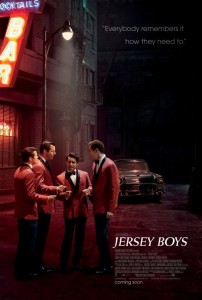More on “Jersey Boys” Director Clint Eastwood
Posted on June 27, 2014 at 4:28 pm
Clint Eastwood is not a favorite of mine as an actor or a director, though I appreciate some of his work. I think his best performance may have been in Gran Torino, which he also directed. But as a director, he was able to create the movie around his strengths as an actor and around our relationship with him as a performer and persona.
I like “Letters from Iwo Jima,” and think his first film as a director, Play Misty for Me is a nice little thriller. But he completely missed the mark in adapting one of my favorite books, Midnight in the Garden of Good and Evil
and I really dislike his Oscar-winner “Million Dollar Baby,” which I thought showed his greatest faults as a director in it heavy-handedness and lack of trust for the audience.
I give him credit for trying to sing in “Paint Your Wagon.”
He did all right with “Jersey Boys,” but it could have been better. Christy Lemire, who agrees with me that it is only pretty good, has an interesting piece about Eastwood’s own take on his films, commenting on his six favorites. Bilge Ebiri wrote a thoughtful assessment of Eastwood for Rolling Stone.
There are, you could argue, two Clint Eastwoods. One is the strong, near-silent type, the man with no name but a pair of Colt revolvers or a .44 Magnum, the lean avenging angel who asks if you feel lucky, punk, and would care to make his day. Whether he’s a tough cop, a tough cowboy, a tough secret-service agent, a tough military man, a tough experimental-jet-fighter pilot or a tough racist old coot, the part is a variation on Eastwood’s screen persona. His status as a macho icon was cast in immovable granite early on; to many, Eastwood is still the man who wielded suggestively-long barreled guns and doled out ruthless justice to criminals and assorted thugs. He is Dirty Harry, by any other name.
Then there’s the Clint behind the camera, the classicist who evokes old-school filmmakers like John Ford and Eastwood’s mentor Don Siegel, the guy who likes to keep things nice and easy on the set, and never likes to do more than a few takes. The director who makes movies that feel ambivalent about taking the law into your own hands, and biopics about jazz musicians, and a genuine tearjerker about a love between two late-in-life romantics that could not be. The serious gentleman who gets nominated for, and occasionally wins, Oscars. The Clint Eastwood who adapts a megapopular Broadway musical for the big screen.
And Andrew Romano calls him the most overrated director in The Daily Beast.
His style is largely procedural. As Esquire’s Tom Junod has written, “the Clint Movie is itself defined by what he won’t do. He won’t go over budget. He won’t go over schedule. He won’t storyboard. He won’t produce a shot list. He won’t rehearse. He doesn’t say “Action” … and he doesn’t say “Cut.” He won’t, in the words of his friend Morgan Freeman, “shoot a foot of film until the script is done,” and once the script is done, he won’t change it. He doesn’t heed the notes supplied by studio executives…He won’t accept the judgment of test screenings…He is well-known for his first takes—for expecting his actors and crew to be prepared for them and for moving on if he gets what he wants.”
I’m not sure that makes him the most overrated, but I agree that he is more serviceable than inspired.

